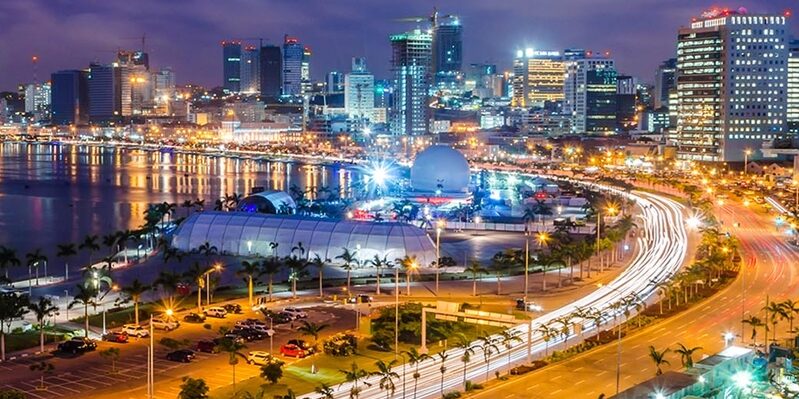The Republic of Angola is a vast country with a coastline spanning 1,600km, sharing borders with Namibia to the south, and Zambia and the Democratic Republic of the Congo (DRC) to the east and northeast, respectively.
A lower middle-income country, the backbone of Angola’s economy is driven by its oil industry, which, along with fishing, are the country’s main sources of foreign investment. The upstream oil industry is Angola’s primary source of foreign exchange, contributing to approximately half of its GDP and 90% of exports.
With an agenda to diversify its economy, process more of its raw materials in country and increase trade with its neighbors, Angola has prioritized strengthening regional ties, leveraging global and regional organizations such as the United Nations, the Organization of the Petroleum Exporting Countries, the African Union, the Port Management Association of Eastern and Southern Africa, and the Southern African Development Community (SADC).
Expanding Regional Trade through SADC
The Angolan government seeks to boost refining capacity for crude oil and other associated petrochemicals within Angola to supply an ever-growing SADC market. This it hopes, will not only ensure increased value creation for Angola but will also ensure supply security for Angola and the region as well as help to boost sectors like agriculture and power generation in the region that are dependent on by products like fertilizer and gas. Headquartered in Botswana’s capital city of Gaborone, SADC is an inter-governmental organization comprised of 16 southern African countries including Angola, Botswana, Comoros, the DRC, Eswatini, Lesotho, Madagascar, Malawi, Mauritius, Mozambique, Namibia, Seychelles, South Africa, Tanzania, Zambia, and Zimbabwe.
SADC’s primary objective is to further regional socio-economic cooperation and integration between member-countries as well as to drive political relations and security within the region. In 2019, H.E. Jofre Van-Dúnen Júnior, Angola’s Trade Minister expressed his ministry’s commitment to developing the requisite conditions to ascend Angola to the SADC Free Trade Area, an agreement designed to enhance economic development and contribute towards the improvement of domestic, cross-border, and foreign investment.
Towards Improved Angola-Rwanda Cooperation
Marking a significant milestone in bilateral relations between Angola and Rwanda, the Joint Permanent Commission on Cooperation explored new areas of cooperation between the two countries in education, finance, defense and security, vocational training, infrastructure, and tourism, among other sectors, adding to previously agreed-upon accords in the sectors of health, justice, and agriculture. Having signed nine different agreements, which included the Double Taxation Avoidance Agreement, the Extradition Agreement, and agreements on Mutual Legal Assistance and the Transfer of Convicted Persons, during the commission’s first joint session, which was convened in Rwanda’s capital of Kigali in April this year, the delegation was led by Angola’s Minister of External Relations, H.E. Ambassador Tete António and Rwanda’s Minister of Foreign Affairs and Cooperation, H.E. Dr. Vincent Biruta. As the countries seek to strengthen regional cooperation in the coming years, the Commission’s second session is scheduled to take place in Luanda in 2024.
Angola, DRC Bilateral Cooperation
As members of SADC and the intergovernmental organization, the International Conference on the Great Lakes Region, Angola and its neighbor, the DRC are closely involved in international relations, holding high level contracts related to peace, stability and security in the region. With the aim of expanding exploration and production in the hydrocarbons sector while accelerating infrastructural growth and developing a regional market, the DRC has opened itself up to improving cooperation with its regional counterparts, including Angola, to expand energy exploration and production. In October 2021, H.E. Minister António along with DRC Deputy Prime Minister and Minister of Foreign Affairs, H.E. Cristophe Lutundula Apala and the Minister of Regional Integration, H.E. Didier Mazenga Mukanzu, signed a Verbal Process and a Trade Agreement in an effort to strengthen bilateral cooperation between the two countries.
Angola, Zambia Improve Energy Relations
Zambia is one of the world’s largest producers of copper and other key minerals with an ever-increasing demand for energy to transform these minerals. Angola is positioning itself to be able to meet this increasing demand for energy, both in refined products and power generation. In an effort to help curb energy poverty in sub-Saharan Africa and enhance the production of domestic oil and gas resources, Angola and Zambia signed a cooperation deal in April 2022 for the latter to own a stake in Angola’s upcoming Lobito Refinery, an upcoming refinery situated in Angola’s Benguela Province set to come online in 2026 with a refining capacity of 100,000 to 200,000 barrels of oil per day. The signing of the deal was described by Zambia’s Minister of Energy, H.E. Peter Chibwe Kapala as part of efforts by Zambia to improve energy relations with SADC member-countries and to ensure energy security and affordability in the region.
Angola Strengthens Ties with Senegal
As part of the first-ever visit to Angola by a Senegalese head of state, H.E. President Macky Sall met with his counterpart, H.E. President João Lourenço at the Luanda Presidential Palace in May 2022 to discuss strengthening international relations between the two countries, laying the groundwork for strengthening mutual cooperation in economic development. With Angola having recently been exalted to the position of Africa’s largest oil producer, Angola and Senegal have sought to strengthen cooperation in economic development, particularly with regards to oil and gas reserves, with the two heads of state having signed six cooperation agreements in the fields of justice, trade, tourism, and oil, as well as the promotion and protection of investments in Luanda.
![]()




